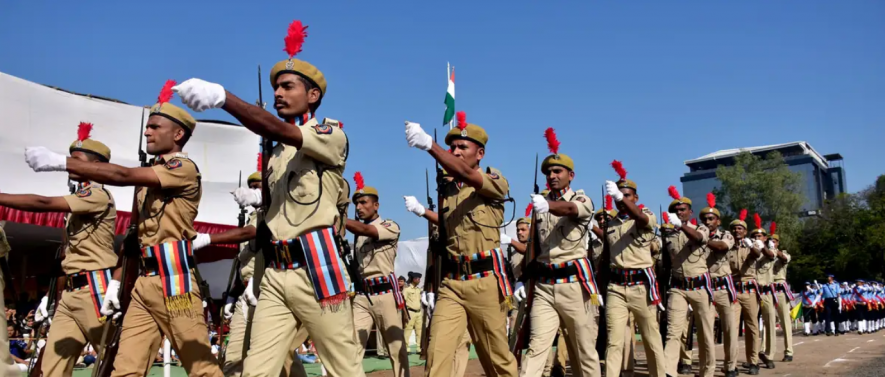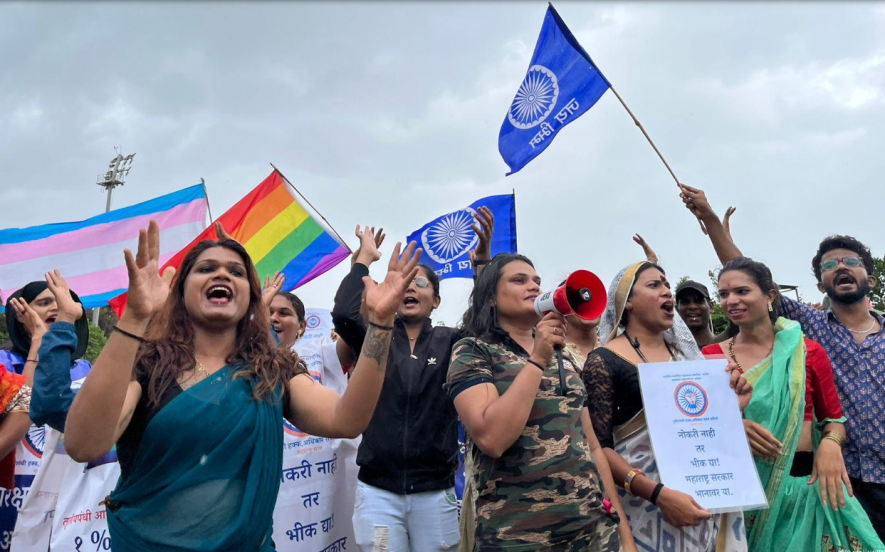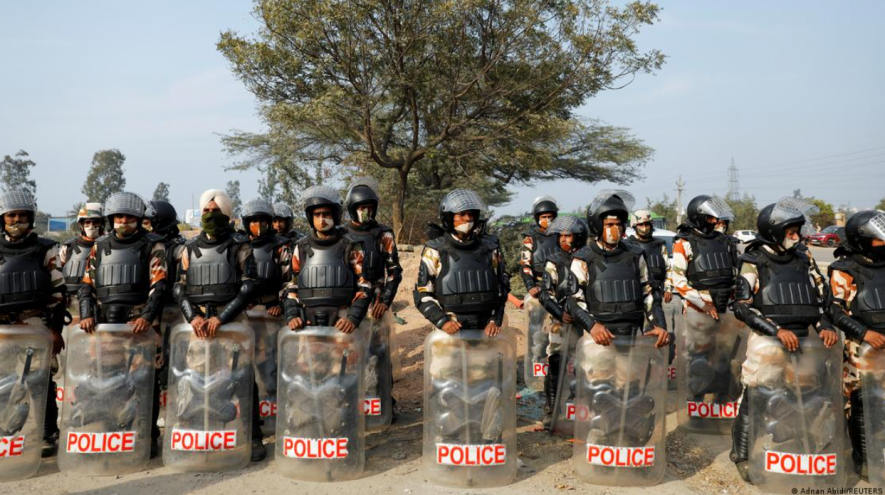India's transgender people demand inclusion in police forces

Transgender individuals have encountered difficulties trying to join the Maharashtra state police force
It has been a trying day for Nikita Mukhydal, a transgender woman from the western Indian state of Maharashtra who is fighting for the inclusion of transgender people in the state police force.
Dressed in camouflage attire, she led a protest march with several others from the transgender community over the Maharashtra police force's application policies. It was their second demonstration in two months.
"It has always been a fight for gender identity," Mukhydal, who was assigned male at birth, told DW.
"When I was around 4 years old, my mannerisms began to look like those of a girl. I liked being a girl. It was what my body was making me do, making me walk like a girl, talk like a girl," she said. "Society told me that I was different."
Mukhydal realized she wanted to be a police officer after working as a security guard. She applied for the Maharashtra police force in 2022, but she found there was no third gender category. She was also not allowed to apply under the female category.

Nikita Mukhydal (holding bullhorn) says qualified transgender applicants to police forces are discriminated against
Mukhydal and several other transgender individuals then approached an administrative tribunal, which ordered the state to create a provision for transgenders in the recruitment form.
"The department went to court against the order, saying that we were not capable for police recruitment. Our lawyer argued how can we be deemed incapable without being examined and without taking our physical and written exams? The High Court ruled in our favor," she said.
Transgender applicants encounter many obstacles
In December 2022, transgender people were permitted to fill out the recruitment form. However, the process was not easy. Mukhydal said they were given only five days to finish the application.
"Despite that, 73 transgender people filled out the forms. But if this time frame would have been a month long, maybe 1,000 applications would have come in," she said.
They were then given three months to prepare for the physical standards test.
"The attitude of the government was negative toward us. They had already decided that we were not capable," she said.
Mukhydal passed the physical test. However, she was dismayed to see that her name, along with other transgender applicants, was listed in the female column, despite having spent time and effort to have a third gender included.
When it came time for the written test, the transgender group ended up being included with male and female groups, both of which had more time to prepare.
"We were disqualified because we could not compete with people in those general categories," she said.
At 35 years old, Mukhydal is at the age limit in Maharashtra for applying to the police force. She feels that had it not been for the overly complicated bureaucracy, she would have been accepted. However, this will not keep her from campaigning for the rights of others who face similar obstacles.
In 2014, India's top court ruled that the transgender community would be treated as a third gender.
The verdict also ordered the government to provide a quota of 1% for transgender persons to be included in jobs and education, which is a similar percentage in line with other minority groups.
Transgender groups across India are demanding the implementation of this 1% quota. However, so far, only the southern state of Karnataka has implemented the 1% reservation for transgender people in public employment.
Transgender community motivated for public service
In the central state of Chhattisgarh, 13 transgender people were recruited by the police force in 2021. Nine transgender people are now part of a specialized unit of the Chhattisgarh Police that is deployed in Maoist-insurgency hit areas.
"They are undergoing specialized general warfare training. They are doing fairly well. They are quite motivated. And their morale after joining the force is very high," a senior official from the Chhattisgarh Police told DW, under condition of anonymity.
"The move has also made the force more inclusive and more sensitive. It is expected from the police force to be impartial and sensitive. That impartiality and sensitivity is more visible if you include all the sections of the society," he added.

Including transgender people in India's police forces will be a gradual process
The senior official said the police department has welcomed the transgender persons in its ranks, even if there is extra work to be done.
"Once you have included the third gender, the force should be sensitized so that there is no discrimination within the forces. People in the police forces also belong to the same society as the third gender. Now, you are in the same force, you have to do the duty together, shoulder-to-shoulder," he said.
He said there have yet to be any complaints, but admitted there may be complications in the future.
"There could be a few challenges like separate restrooms or barracks. Until now it hasn't come up, but these are a few challenges that I foresee. Right now, the numbers of transgender people are very small, once the numbers grow then there could be a possibility of these challenges," he said.
Mukhydal believes that when transgender people are allowed into government jobs, equality will follow.
"The biggest change would be that transgender people would able to break away from the means of income like begging and sex work. Once we start getting government jobs, our future generations will see that there are other options and a life of respect," she said.
Edited by: Wesley Rahn
Get the latest reports & analysis with people's perspective on Protests, movements & deep analytical videos, discussions of the current affairs in your Telegram app. Subscribe to NewsClick's Telegram channel & get Real-Time updates on stories, as they get published on our website.














